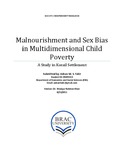Malnourishment and sex bias in multidimensional child poverty
Abstract
Evidence of severe malnourishment and anti-female sex bias has been found in the Korail urban slum settlement of Dhaka. The sex bias is reflected in terms of lower growth dynamics, varying degrees of malnourishment and deprivation in several development indicators. The study deployed a weighted Alkire-Foster methodology for identifying multidimensional poverty and has identified behavioral and public health attributes to play a significantly larger role in reducing malnourishment and sex bias compared to economic variables, such as income and assets. Mother‟s education for the region of study, although lowered malnourishment, was surprisingly found to not play a significant role in sex bias reduction. An ordered logistic regression model was run to determine the statistical significance of the variables which yielded amongst others that deprivations in type of latrine used and in awareness of local medical costing significantly increased malnourishment.

